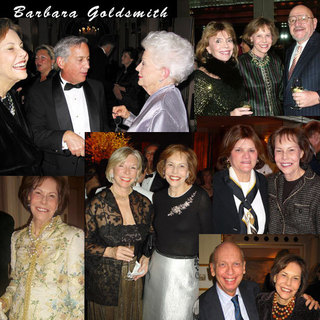New York Social Diary Profile of Barbara Goldsmith
New York Social Diary
by David Patrick Columbia
An interview with Barbara Goldsmith about her extraordinary accomplishments left me gasping. Dressed in sweats and drinking tea in her sprawling Park Avenue apartment, this petite woman of the world is a bestselling author, philanthropist, historian, intellectual socialite (you might say), winner of two Emmy Awards, recipient of four doctorates honoris causa, a founder of New York Magazine, mother of three, grandmother of six.
Have I left anything out? Oh, by the way, that book you are reading is printed on acid- free paper, thanks to Barbara Goldsmith.
She headed a campaign that included convincing Congress to contribute $20 million for converting books to acid-free permanent paper. “A library is my breakfast at Tiffany’s,” she confesses, explaining why she is a major donor at preservation and conservation institutions around the world and trustee at the New York Public Library.
Is there anything Barbara Goldsmith doesn’t accomplish when she decides to put her drive, intelligence and passion to a cause? “I would like to devote myself just to writing,” she says in her quick, frank manner. “But I can’t, not when there are human lives out there suffering.” For some twenty years under the auspices of the “PEN/Barbara Goldsmith Freedom to Write Awards” she has been advocating on behalf of persecuted writers throughout the world. As a result of the media focus from her Awards (which she underwrites), almost all of the winning who were lingering in prison, often tortured and censored, have been released. Ask her about any of these writers and in seconds she rattles off the dire details of their lives.
“I’m a born optimist,” straightforwardly pronounces Goldsmith. You also could say she never seems to doubt herself. She grew up in New Rochelle into a privileged family that had Horatio Alger roots. Her father, Joseph Lubin, was born in a lower east side tenement and by the age of 40 was board chairman of Pepsi-Cola. Despite their wealth, dinners weren’t spent talking about business but books, philanthropy, history.
“My mother always told me never to feel guilty about splurging on books or doctors, she remembers.” After graduating from Wellesley in an era when most women didn’t expect a career, Barbara instantly launched herself in journalist. “It never occurred to me not to work. I knew I had to work to be my own person.” says Goldsmith. “I just didn’t sleep for the next twenty years.”
Starting at the age of 21, she began writing profiles about Cary Grant, Andy Warhol, Audrey Hepburn and then on to write her acclaimed books: The Straw Man; Little Gloria Happy At Last; Johnson v. Johnson; Other Powers: The Age of Suffrage; Spiritualism; and the Scandalous VictoriaWoodhull (soon to become a feature film) and Obsessive Genius: The Inner World of Marie Curie. “By the way, I don’t just write about the rich and famous, I write about historical periods,” she insists.
Some apartments immediately tell the story of their owner. Looking around this light filled apartment high above Park Avenue, the richness of her life is apparent. Though decorated by her friend, Mica Ertegun in neutral colors, the walls are filled with her choices of art, books, and personal photographs.
Among others, there is a black and white photo of Barbara, wistful and beautiful, taken by Andy Warhol, a large painting of her by Larry Rivers in her library and a bold Louise Nevelson sculpture in the entrance. Pictures of her with Cary Grant, Gloria Vanderbilt, Hillary Clinton, and Tom Wolfe line the walls as do her children and adorable grandchildren. “The core of my friends are writers, researchers, artists,” she says, “But I’m also friends with people you might call “social.”
The endless bookshelves in her dining room are filled with leather bound copies of her writing. Her newest prize- winning book on Marie Curie has already been translated into fifteen languages. “The other day I was on the subway, I saw someone reading Curie. It doesn’t get better than this,” fondly says Goldsmith.
